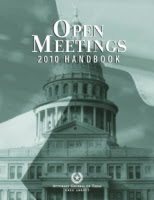 |
The "law of unintended consequences" states that any well-intentioned action will produce some unintended, unwanted consequences. The Texas Open Meetings Act is not exempt from this law. The act stipulates that local governments must publicly post agendas for meetings at least 72 hours in advance. They are forbidden from deliberating issues that are not included in the agenda.
The purpose of the Open Meetings Act is to make sure the public is aware of what business the governmental body will conduct and where and when that business is conducted. By and large, the act has served its purpose. Meetings are open.
After the jump, what can be wrong with that?
What are the unintended consequences of the Open Meetings Act? Well, for one, it can make it more difficult to get government to respond to citizen complaints, requests, and suggestions. For example, at each meeting of the Richardson City Council, time is set aside in a "Visitors" section for citizens to speak on whatever matter they wish to bring before the council. The subjects do not appear on the agenda. Because of the Open Meetings Act, the council is forbidden from deliberating on the spot on the matters raised. Often, it's like the council is gagged and the matters of concern to citizens are swallowed by a black hole. Visitors unfamiliar with the Open Meetings Act must feel frustrated by the seeming lack of interest by the council. To some, "Visitors" section must seem farcical.
Citizen: Does anyone else smell smoke? I think there might be a fire in city hall. What's that coming from the vents? Smoke!?!Mayor: We can't discuss that matter tonight, but maybe it will be added to a future agenda. Thank you for your input. Are there any other visitors who wish to speak?
A city council can take advantage of the Open Meetings Act, using it as an easy way to duck answering tough questions. I'm sure it's a tempting and convenient way to dismiss the cranks and crackpots who tend to dominate "Visitors" section. But there's an unintended consequence to that reacion, too. The council appears to be uncaring. Citizens lose trust in their city council. Complaints grow. It's a vicious circle that leads to no good for anyone, including the council.
I've lobbied for better community outreach by the Richardson City Council. An easy step to take is for the city manager to publicly post a written response to every visitor who takes the time to raise an issue at council meetings. The city duly notes what the issues are in the minutes of each city council meeting. The city should publicly post an official response as well. Dedicate a section of the city's Website for this purpose (maybe something like the new Rumorcheck.org Website that addresses some of the matters repeatedly raised during "Visitors" section of Richardson City Council meetings). Then, each week's collection of responses could be added to the agenda of the next council meeting, giving council members the opportunity to publicly respond to the matters raised.
The Open Meetings Act was intended to ensure public officials deliberate in public. Local governments should not let it serve as a gag rule on their ability to respond to citizen concerns.

No comments:
Post a Comment